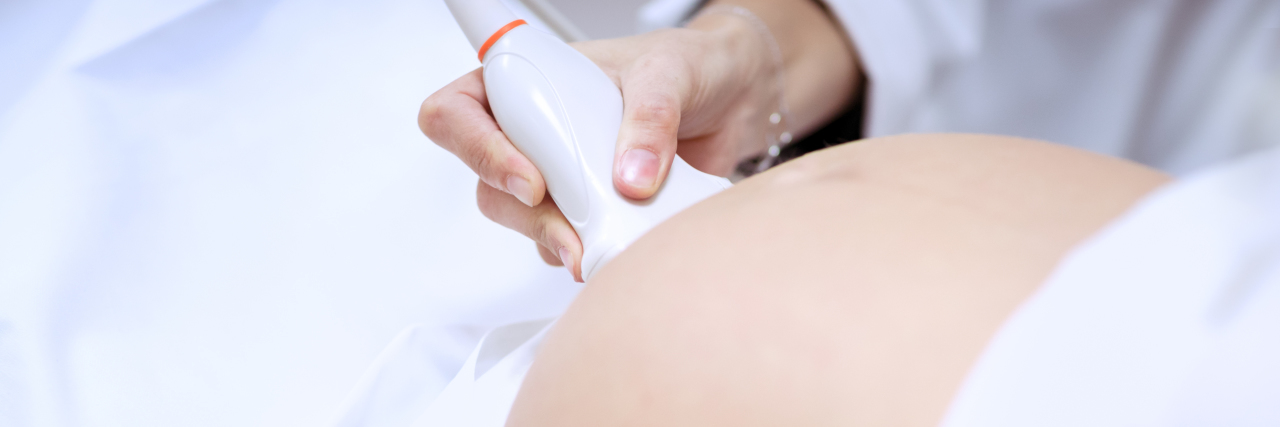I wanted to write the article I wanted to read when I was pregnant last year.
So, here it is.
At the end of 2017 we found ourselves pregnant with our second child. I was 34-years-old and we were parents to a daughter who had just had her first birthday. I didn’t even know I wanted to have two children until I watched Ella playing alone, and thought to myself how much I loved my own brother (two years my junior).
We were excited about the pregnancy. The name was a topic I obsessed over from day one. Names are a huge deal to me, and we couldn’t agree on many. The first several weeks passed without incident. Around the ninth week, I visited my doctor’s office and was given the talk about being of “advanced maternal age” and handed some paperwork about all the additional testing that was recommended to me. We had opted into all testing that was offered with Ella. The only one we hadn’t opted into right away was the nuchal translucency scan, an ultrasound that, among other things, can detect early signs of Down syndrome. I remember calling in the eleventh hour saying we would go ahead and do it. We decided at the last minute that although it didn’t matter to us, knowing ahead of time couldn’t hurt. A friend of mine had just gone through the scan herself and told me the “normal” range measurement. I remember watching for it on the screen and being relieved when I saw the number.
This time around, being of advanced maternal age, there were other tests available, other tests recommended. Instead of the nuchal translucency scan, a blood test through a prenatal genetic testing company was recommended. They told me this test would also tell us the sex of the baby early. Sold. They tied off my arm and took a few vials of blood and sent me on my way.
The test came back inconclusive. My insurance was billed $8,000. I was not a happy camper. Twenty weeks came and went. We had our 20-week scan and were told that everything looked just fine. Then came the quad screen, another test I signed up for without much thought. Another blood draw, and away I went. We had an ultrasound to find out the sex of the baby since the first blood draw had been inconclusive. A boy. We purchased a little stuffed toy with a recording of his heartbeat and gave it to Ella when we got home. We excitedly talked about names and disagreed on nearly all of them.
The call came after hours, around 6 p.m. I was sitting in the parking lot at Target when my phone rang. I answered, greeted by one of the doctors in my practice. He said my quad screen had come back abnormal. I asked what this meant, and he told me that there was a 5% chance that my baby would have a genetic condition. My heart pounded in my chest as I frantically tried to translate the meaning of the words. He told me they would set us up to have another ultrasound with genetics. I thanked him and hung up the phone. I felt numb. As crazy as it sounds, I never envisioned a situation like this. Sure, I had agreed to the tests, but I never expected a call like this one. I don’t know if anyone does.
We visited the genetics office. The ultrasound tech was quiet and took plenty of photos. The baby kept turning his face and they couldn’t get a clear picture. After the ultrasound, we were sequestered into a tiny room with a round table and three chairs. A lone box of tissues sat in the middle of the table. A young woman walked in with a solemn face. She informed us that everything looked OK on the ultrasound, except the ultrasound tech couldn’t find the nose bone. I was irritated. They hadn’t been able to see his face at all, so of course they didn’t see his nose bone.
She sat across from us and told us that the quad screen indicated a risk for Down syndrome. She rattled off a laundry list of health issues that could go along with Down syndrome. She asked if we knew anyone with Down syndrome. Not personally, we said. But we are aware of the condition. She pulled out a book of photos featuring children and adults with Down syndrome. This was starting to feel awkward. Chris told her that we had discussed adopting a child with Down syndrome in the past. She looked surprised. She then told us we could terminate, but we would have to travel far. I said that was not an option. She then said she recommended I schedule an amniocentesis. Knowing the risk associated with that procedure, I declined. She argued with me, saying the baby was now viable at 24 weeks, and if spontaneous labor occurred, there would be a chance for him to survive. Not interested, we said. She recommended we do another blood draw to send to the genetic testing company. This was starting to feel like a sales pitch, but I agreed since it wasn’t invasive. We left in silence with the box of tissues untouched, and feeling uncomfortable about the events of the day and her approach.
The call came a week later. I stepped into a conference room at work. The genetic counselor informed me that the test had come back “positive” for Down syndrome.
“So, he does have Down syndrome?” I asked.
“Well, we don’t know,” the genetic counselor said.
“But you just said the test was positive. That sounds pretty definitive,” I said.
“The chance is about 40%,” the genetic counselor said.
I thanked her and hung up, feeling confused and aggravated by her lack of clear explanation about how she had arrived at that number. From that point on, I decided to do my own research. I made the choice to be at peace with any outcome. I began to research Down syndrome, and I began to research genetic testing. Though the odds were 40%, the doctors spoke of my son’s condition every time I saw them for the remainder of the pregnancy. If nothing else (and there really was nothing else) the genetic counselor had left me with a healthy fear of additional complications that could come along with a baby who was diagnosed with Down syndrome.
We visited Children’s Hospital Cardiology Division and had two separate scans on his heart, and both times the cardiologist felt confident saying there were no issues. We continued on with the pregnancy and there were stressful days scattered throughout. The long list of potential health risks that had been shared with us loomed over me like a dark cloud.
The day before I gave birth to our son, I sat in the living room talking with Chris. It was one of those small, yet pivotal moments in life that you never forget.
“Do you think he’ll have Down syndrome?” I asked him.
“I don’t know,” he said.
He stood in the archway of the kitchen, looking down at me where I sat on the sofa.
“Do you think he will?” He asked.
I paused…
“I think I’ll be more surprised if he doesn’t,” I said.
The next day, Abel Joshua arrived, four weeks early. It was a chaotic birth; the labor, drive to the hospital, and delivery took less than an hour and a half from start to finish. Due to some complications during delivery, he was whisked away to the NICU immediately following his birth. The head nurse held him up for just a moment so I could see his face. He looked like a beautiful little baby to me. His recovery was all that mattered.
I went to see him in the NICU. The doctors and most of the nurses proceeded to tread carefully and wouldn’t confirm any diagnosis until his karyotype tests came back with conclusive information. A few of the nurses were not afraid to be candid and gently shared their suspicions. These musings were not unwelcome to us. We already knew the results before they came. And, that first week in the hospital, they did come. Trisomy 21. Down syndrome.
And, I didn’t care. We didn’t care. We remarked on how little this information actually mattered to us. He was a gorgeous, little baby with big dark eyes and a shock of soft blonde hair. He was wide-eyed and alert from the beginning, peering out into a world that I had come to suspect largely did not understand him or others like him. I also realized that this was no fault of theirs. There are some situations that you simply don’t know about or understand until you experience them for yourself. I knew about Down syndrome, but had virtually no exposure to anyone who had it. I had never conversed with or befriended anyone with Down syndrome, and the fact that it had never occurred to me to go out of my way to do so suddenly bothered me.
The first 35 days of his life were spent in the NICU as he struggled with learning to eat. We didn’t see our son’s face free of tubes until he was one-month-old. Every day without fail we made the two hour round trip to the hospital, sometimes twice a day, to cradle his tiny body and learn what his needs were. The NICU became a home away from home. When we were finally discharged, it was bittersweet. We couldn’t wait to bring him home, but the NICU nurses had become a second family to us, laughing, crying, and celebrating with us over the past month.
The genetic counselor knew a lot of cold hard facts, but what she didn’t mention was the joy that he would undoubtedly bring into our lives. She spoke of hardships, and instead, we were met with a gift that I’m not sure a person can fully understand until they are presented with it. Ever since he was born he has brought nothing but joy to our lives. It’s true, he has a few more appointments and frequent therapy, but none of those things are difficult. They are just things we do for our son, just like anyone else would.
I’ve been asked many times if I had it to do over, would I do the genetic testing? I’ve thought about it a lot, and my answer is “yes, I would do it all again.” And to the parents who have also chosen prenatal genetic testing and are struggling with the negativity that is so often thrown at them from every direction, I want you to know — IT IS GOING TO BE OK. Your life is about to change in the most wonderful way. You will be embraced by the most loving community of people the world has to offer. You will be given instant support and no judgement when you speak to other parents of children with Down syndrome.
Your baby will smile at you, and you will have no question that this is your reason for living. You will experience a love so pure that I’m convinced that people with Down syndrome might actually be angels walking on the earth. You will witness even the most hardened individuals soften at the sight of your child’s smile. Think of these things when you are laying in bed at night, overwhelmed by the fears in your head. Lastly, and most importantly, I’d like to extend a very warm welcome to the club that many of us refer to as “The Lucky Few.”
Photo credit: Anna_Om/Getty Images


